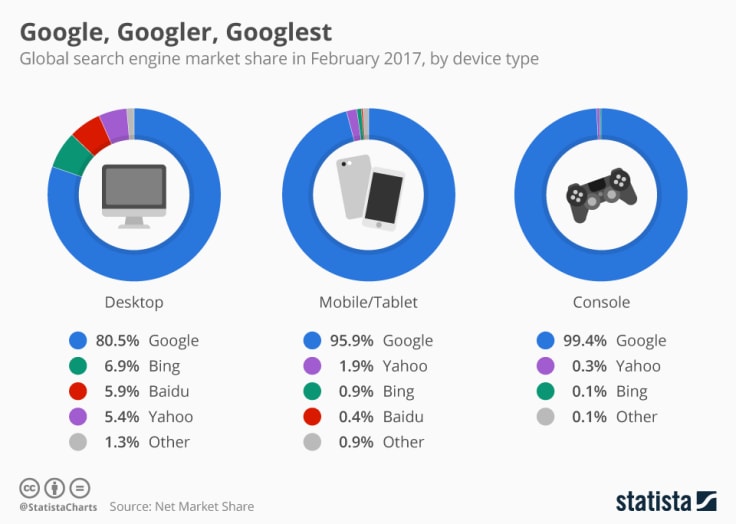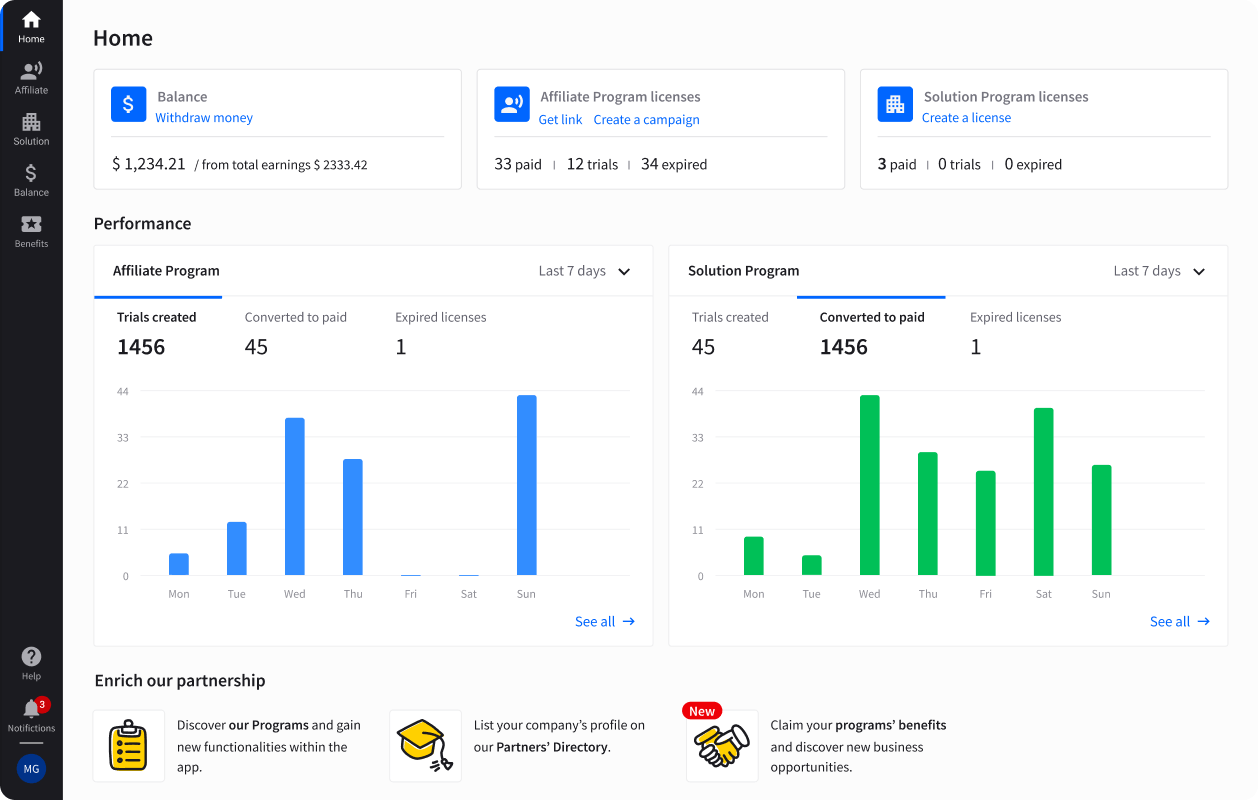Showing top 0 results 0 results found
Showing top 0 results 0 results found

When you think about SEO you think about Google, don't you? This makes sense as Google is the indisputable king of the web. No surprise here.

As you can see on the chart above provided by Statista, the global search engine market share in February 2017 clearly indicates the leader. Google owns a whooping 80.5% of all desktop searches and 95.9% of mobile + tablet searches.
Google pwned the competition!
Ok, uncle Google clearly dominates the world of search, but this doesn't mean you can ignore the rest. Don't be so single minded! In fact, you should cover all the opportunities into your marketing efforts and fight for the remaining 19.5 % of the desktop search volume, and make sure you maximize your overall traffic. After all, these numbers are still totally worth the effort because they constitute millions and millions of searches.
How many searches are made each day? 6,586,013,574 searches a day worldwide
This translates to:
- 4,464,000,000 searches per day on Google
- 873,964,000 searches per day on Bing
- 583,520,803 searches per day on Baidu
- 536,101,505 searches per day on Yahoo
- 128,427,264 searches per day on Other (AOL, Ask etc)
That's 2,122,013,572 searches combined.
Moreover, relying solely on Google search traffic can be quite risky. Why?
Well, if you put all your eggs in one basket, you never know what happens when this basket breaks. Google frequently rolls out new algorithm updates and history proves that they can ruin online presence of many businesses overnight that don't align with the requirements right away.
Let's recall the infamous Penguin update from back in 2008. For some websites, Penguin caused a 80% drop in organic traffic over a few days. That was horrifying!

Trust me, you don't want something like this to happen to your site. What if your site gets penalized next time and knocked out of the first results page. If you bet solely on Google, this could be quite a realistic scenario.
Okay, I think you're now ready to dive into the other organic traffic sources, beyond Google. So what's there for you and how can you optimize for the other traffic sources?
Bing and Yahoo: Another SEO Opportunity
A lot of search marketers focus on Google, entirely ignoring the Bing and Yahoo. That's a huge mistake because these two Google's alternatives can make for a lucrative traffic source too.
Especially, that both Mozilla and Firefox have removed Google as the default search engine (back in 2014).
In fact, Bing and Yahoo might be your business's biggest untapped traffic opportunity, since they both hold 11% of market share in United States. Optimize your website specifically for these two search engines and see how much you can squeeze out of it.
There are some good news about optimizing for these two search traffic sources.
- Yahoo is powered by Bing, so you practically need just to master Bing ranking factors and the results will be visible all around.
- And another piece of good news is that Bing and Google are quite similar to each other. So if you already pay attention to Google ranking factors, there are only several differences you should be aware of.
Audience
First of all, Bing's traffic is said to convert better.
This can have something to do with Bing's demographic. Bing users tend to be more mature, having arguably more money than Google's users what makes them a more profitable target for you.
Matthew Woodward reveals that traffic from Bing, indicates much lower bounce rate than Google's traffic. Moreover, Bing's traffic indicates much higher quality, apart from the better bounce rate score, average session duration was longer and visitors viewed more pages within the one session.

Ranking
Technically, all search engine algorithms are based on analyzing keywords and the number of high-quality backlinks. However, while Google favours the popular sites, Bing ranks older domains much higher and includes more official endings such as .edu, .gov.
This means that Google is sensitive to the dynamically changing trends to display the most relevant information to a searcher. On the other hand, Bing gets more traditional here and simply ranks information from the older and more authoritative domains higher.
Also, Bing favours websites that have plenty of unique content. It should be engaging, but can get shorter than Google demands. Bing puts significantly less weight to the quality of backlinks while calculating the position in SERPS.
Local search
You can observe some further differences between Google and Bing while checking up on local search results. In practice, Bing's local results get more local than on Google. In fact, while Google tends to promote more popular and larger websites, with Bing it's easier to rank with your small, local business.
On-page optimization
Google is smarter than Bing.
On-page optimization on Google has been taken to the next level some time ago. While Google deploys AI, understands the context and is constantly under improvement, prioritizing for user's intent, Bing is still oldschool and far behind.
Being less intuitive, Bing relies heavily on keywords and with it's strict optimization rules, is actually easier to handle. Place your target keywords strategically, making sure it's included within your URLs, title tags, headlines, meta descriptions, frequently within the page's copy and you're all set.
I've also found that, contrary to Google, meta tags are still important for Bing SEO. Furthermore, meta tags are said to be a strong Bing's ranking factor and can massively increase the overall ranking of a website.
Backlinks
According to Searchmetrics research, the number of backlinks matters for site's ranking on Bing and the correlation is about .29 to how a site ranks. Also most links among the top 30 Bing results contain a target keyword in the anchor and around 2% of backlinks include the stop word. This means, that the quantity of backlinks trumps the quality of backlinks on Bing.
Bing loves organic backlinks coming from the old and authoritative domains like, in particular, .edu and .gov.
Here is the official Bing's statement about backlinks importance for search ranking:
Links pointing to your site help Bing discover new pages on your site. Traditionally, it is also regarded as a signal of popularity. The site linking to your content is essentially telling Bing that they trust your content.
Competition
Another Bing SEO advantage is the fact that most search marketers focus on Google, so Bing has lower competition on it's playground.
Back to you
Apart from search engines, great source of traffic is social media. There are 15 possible social media platforms and other social forums that you can get involved with. And Facebook rules this world. So your priority is to put your hands on it.
How to approach Facebook? First you need to build your presence there. Set up fan page for your online business, supplement it with the concise descriptions and create a relevant social media strategy to engage your target audience. Make sure to get consistent and try to optimize your activity over time for the better reach and engagement.
For more information about Facebook Marketing, take a look at my previous guide.
Make sure you actively identify new traffic sources that potentially hold some value for your online presence. Try quora, reddit, linkedin, twitter, email marketing, and more, to see what channels bring you the best results over time.
Good luck with that and check back with the partners blog as we will feature more information soon. ;)
Questions? Want to talk things further? Feel free to ask in comments below.
Happy Marketing!



